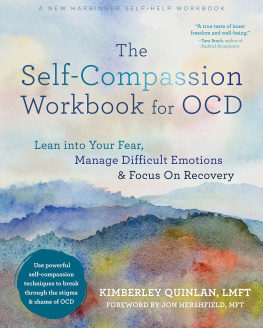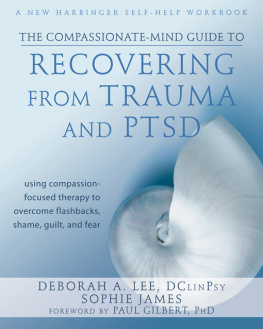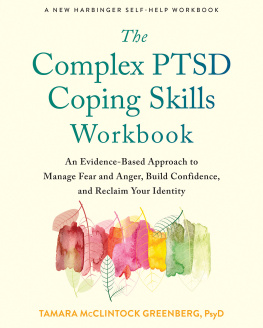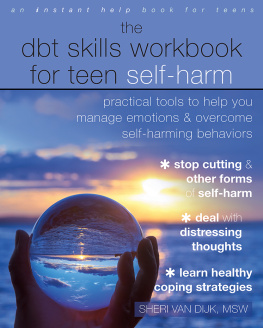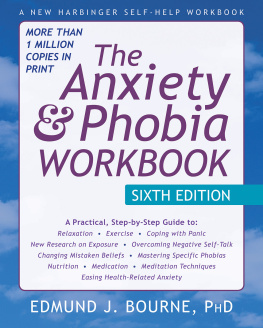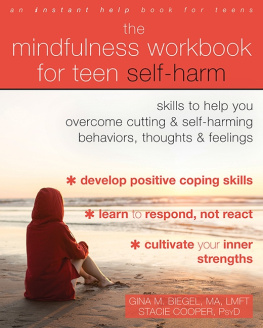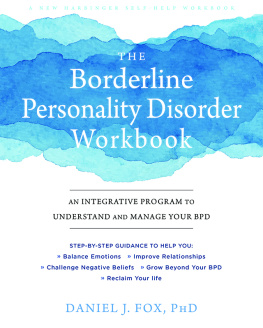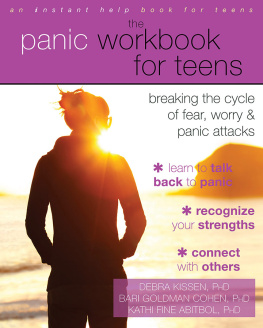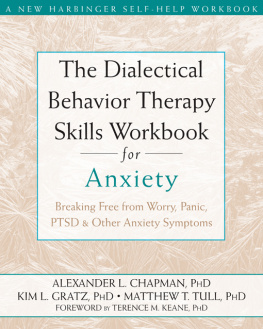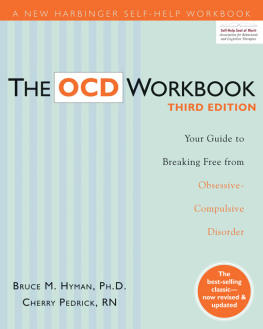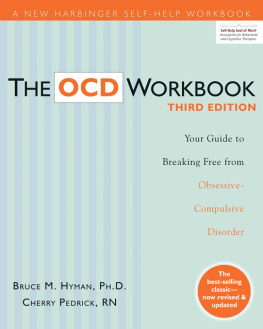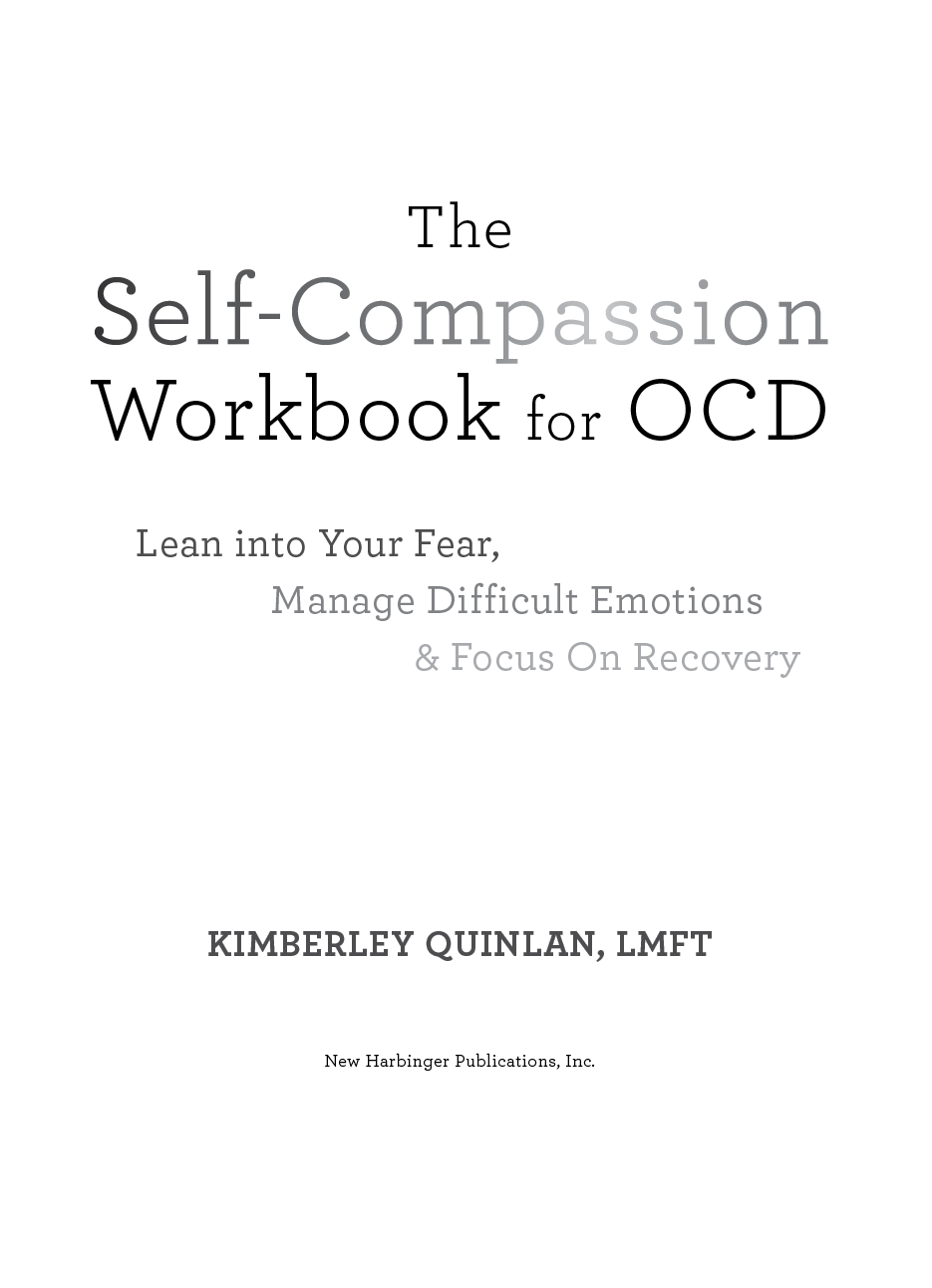Kimberley Quinlan is a wonderful advocate for self-compassion. Having met her, compassion is something she emanates from her very being. She integrates exposure and response prevention (ERP) and self-compassion in her work with people with obsessive-compulsive disorder (OCD), and is now showing how important and useful self-compassion is for OCD recovery through this book.
Stuart Ralph , child and adolescent counselor and psychotherapist, and host of The OCD Stories podcast
Healing becomes possible when we realize we dont have to believe our thoughts. The exercises in this comprehensive and accessible workbook offer those suffering with OCD guidance in meeting mental stories with a patient, forgiving, and wakeful presence. The fruit is a true taste of inner freedom and well-being.
Tara Brach , author of Radical Acceptance and Radical Compassion
Reclaiming your life from OCD requires doing some one-eighties. Learning to facenot avoidyour fears. Treating yourself nicely rather than beating yourself up. And you are holding the only book that teaches you how to do both at the same time! This is the guide to learning how to do self-compassionate ERP for OCD, written by one of the most talented and compassionate ERP therapists I know.
Shala Nicely, LPC , author of Taming OCD , Reclaiming My Life , and Is Fred in the Refrigerator?
If you feel stuck and alone in your struggle against OCD, heres great news. Within you is a storehouse of energyyour compassionate self. With Kimberly Quinlans workbook, youll learn to rejuvenate your spirit so that you can push forward into those daunting challenges. On the other side of this effort is the reward: living a life you love.
Reid Wilson, PhD , author of Stopping the Noise in Your Head
The Self-Compassion Workbook for OCD is a must-have for both therapists who treat OCD and for those who suffer from OCD. It contains essential, research-based tools to fight OCD while also presenting important and practical self-compassion skills to help sufferers better manage their OCD symptoms. The workbook is friendly, easy to read, and offers concrete examples to follow. I look forward to using this workbook with my clients.
Michelle Massi, LMFT , licensed marriage and family therapist, and founder and director of Anxiety Therapy LA
Years after my diagnosis, the shame, guilt, and self-hatred I had for myself made treatment feel impossible. Much later, I began learning the art of self-compassion. Its been life-altering. Kims book must live in every clinician and individuals toolbox. This book not only gives the reader the skills to successfully manage OCD and related disorders, but to managing life and all that comes with it.
Ethan S. Smith , national advocate of the International OCD Foundation
Publishers Note
This publication is designed to provide accurate and authoritative information in regard to the subject matter covered. It is sold with the understanding that the publisher is not engaged in rendering psychological, financial, legal, or other professional services. If expert assistance or counseling is needed, the services of a competent professional should be sought.
Distributed in Canada by Raincoast Books
NEW HARBINGER PUBLICATIONS is a registered trademark of New Harbinger Publications, Inc.
Copyright 2021 by Kimberley Quinlan
New Harbinger Publications, Inc.
5674 Shattuck Avenue
Oakland, CA 94609
Self-Compassion Break, Affectionate Breathing, Compassionate Friend Meditation, and Giving and Receiving Meditation are from The Mindful Self-Compassion Workbook , 2018 Kristin Neff and Chris Germer. Published by the Guilford Press. Used by Permission.
Cover design by Amy Shoup; Interior design by Michele Waters; Acquired by Tesilya Hanauer
All Rights Reserved
Library of Congress Cataloging-in-Publication Data
Names: Quinlan, Kimberley, author. | Hershfield, Jon, author.
Title: The self-compassion workbook for OCD : lean into your fear, manage difficult emotions, and focus on recovery / Kimberley Quinlan, LMFT, Jon Hershfield.
Description: Oakland : New Harbinger Publication, 2021. | Includes bibliographical references.
Identifiers: LCCN 2021014884 | ISBN 9781684037766 (trade paperback)
Subjects: LCSH: Obsessive-compulsive disorder. | Self-acceptance. | Compassion. | Mindfulness (Psychology)
Classification: LCC RC533 .Q85 2021 | DDC 616.85/227--dc23
LC record available at https://lccn.loc.gov/2021014884
Contents
Foreword
A lot of forewords start with a statement like I was first introduced to [insert concept here] in And I was just about to do that. I was first introduced to self-compassion in 2015? Is that possible? What a strange thing to say. How is it that something so basic and fundamental as being good and kind to yourself never occurred to me on its own? Stranger than that, no one bothered to mention it to me! Did others know and keep it a secret? It certainly wasnt taught in school. And, sorry, Mom and Dad, but I dont recall either of you bringing it up. I had read about it, and of course, I used it with my clients, but to organically use self-compassion for my um self felt a bit like break dancing or playing a harmonica or riding a unicyclethings I dont know how to do.
Let me tell you a quick story that makes me look really, really lame. I was on a meditation retreatseveral days of silence, sitting, walking, eating, and self-compassion training. It can be brutal, this self-compassion stuff. Im sitting there, trying to be mindful of the noise my brain makes, trying to be nonjudgmental of the constant judgment going through my head. We were doing a RAIN meditation (a technique which Kimberley Quinlan gracefully describes in this book), and it came time for the N: Nurture. The teacher invited us to find something to say to ourselves that reflected a genuine permission to feel what was being felt in that moment. This right here is what self-compassion is all about, to look at our pain and say, I see you feel thispeople feel thisyou are allowed to be a person who feels this. I waited for the right thought to arise, some mindful ninja warrior thought like all things are impermanent or when you find the Buddha, kill him. I waited and waited and waited. I got bored and stopped looking for the right thought. Then the thought arose in a tone so sweet, it was like a hand just gently landed on my shoulder, so genuine and warm, and so loud I couldve sworn it was audible Its okay, baby. Laugh all you want, I meant it.
Standing up to adversity, including the adversity of our own mental health challenges, is always hard, but it is so much harder when we disallow ourselves from being people with challenges in the first place. We repeatedly engage in self-criticism and self-punishment, because we are living under the delusion that it works, that it promotes better behavior. Its all based on confusion. We say, I should know better than to be in this distress while actively ignoring that our genetics, place of birth, cultural context, and most of our conditioning have nothing to do with us. We think we are bad because we notice vulgar thoughts and disgusting feelings. But what causes us to notice has nothing to do with us. We self-punish because we think it will make better thoughts and feelings arise, but all punishment really does is invite us to be more committed to avoidance. As Kimberley so masterfully lays out in the pages ahead, self-compassion is the path to change. It is the power move in the face of pain. It is the one thing OCD never sees coming.

